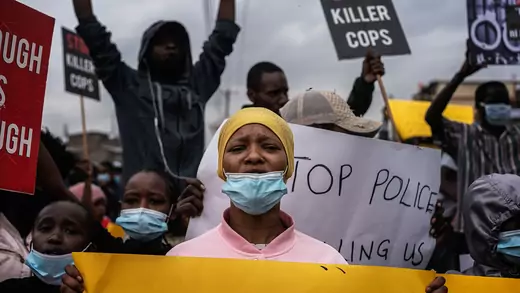The U.S. protests following the police killing of George Floyd have spurred solidarity among many Africans, who have expressed widespread outrage against police brutality.

How are African nations reacting to the anti-racism protests in the United States?
The main reaction has been one of solidarity. African leaders in government, civil society, and creative communities have condemned the police killing of George Floyd and raised alarm about police brutality and systemic racism in the United States.
One of the earliest and most broadly representative statements was made by African Union Commission Chairperson Moussa Faki Mahamat, who recalled that the Organization of African Unity issued a resolution in 1964 condemning racial discrimination in the United States. He reiterated the African Union’s rejection of the continuing discrimination against Black citizens. In addition, the UN Human Rights Council agreed to hold a debate on racism and police brutality after fifty-four African nations proposed such a discussion. The solidarity of African and African-American people dates back to the early days of fighting for independence from colonialism in Africa and for civil rights in the United States.
Africans are questioning whether the United States can maintain its moral position as a defender of human rights globally, given the recurring extrajudicial killings of Black Americans with police impunity. Some have expressed shock and sadness. Others have pointed out U.S. hypocrisy in not respecting human rights and protesters’ constitutional rights of freedom of assembly and speech, values it often preaches to African governments.
Civil society and academic leaders have also called out their own governments for sanctioning excessive use of force and failing to hold police accountable for killing civilians. They lament that African dictators will feel emboldened by U.S. President Donald J. Trump’s actions against demonstrators. They point out that people of African descent worldwide are often treated as if they do not deserve human dignity.
Because of their skin color, Africans in the United States have also been killed by police, including Guinean student Amadou Diallo, who New York police shot forty-one times in 1999, Sudanese refugee John Deng, who Iowa City police killed in 2009, Ugandan immigrant Alfred Olongo, who San Diego police shot in 2016, and so many others.
Police violence is not unknown to many African communities. Are any countries making efforts to reform police forces that could be replicated in the United States?
- Anambra 2025 Governorship Election Might Be an Open Contest - April 24, 2024
- Anambra Assembly Passes Bill To Prohibit Secret Cults - April 24, 2024
- 2024 Aguata NBA Law Week: AG, Prof. Ifemeje Touts Landmarks and Expectations - April 19, 2024


